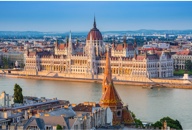Hungarian-German dictionary
Hungary: a country of diversity

The infinite expanses of the Puszta, galloping wild horses, stunning thermal baths and wonderful people – it's no wonder that Sissi, Empress of Austria and Queen of Hungary, raised her fourth child (who she lovingly referred to as the “Hungarian child”) in Hungarian, the language she so loved. There are plenty of reasons that make Hungary a fascinating country: from wooded low mountain ranges to the endless Puszta, from the moderate climate in the north to the Mediterranean in the south, from the exciting metropolis of Budapest down to small – almost ancient – villages. Hungary has plenty of diversity to offer, both on land and on water. Its world-renowned thermal springs are primarily known as areas of rehabilitation and relaxation. But for those in search of exciting leisure activities, a warm welcome for families, or parties, the almost 80-km-long Lake Balaton in western Hungary is the right choice for them. In Hungary, everyone gets their money’s worth.
Magyarország – as Hungary is referred to in its native tongue – is a country steeped in history. It was founded long before France and Germany became independent countries. Everything began with the wild Magyar – as the Hungarians also call themselves today – who orchestrated raids throughout the whole of Europe and, at the end of the ninth century, migrated into the Carpathian Basin. Over the years, Hungary has produced numerous interesting individuals such as Ernő Rubik and Dennis Gábor as well as the brothers József László Biró and György Biró. They may well be unknown to the vast majority of people at first glance, but their world-changing inventions and discoveries are not, because the Rubik's cube, the biro pen and holography are well known to just about everyone.
Football with Langenscheidt
Labdarúgás – it’s not just the most popular sport in Germany; the Hungarians are also massive fans of the team sport. It is no wonder, then, that the “Miracle of Bern” is something that is still etched into people's minds. Even today, the World Cup final on 4 July 1954 is considered a national tragedy. Hungary, the favourite by a wide margin – and known at the time as the “Golden Team” – was beaten by Germany 3:2 in the final. Even though the pain of yesteryear can still be felt in part today, football remains a sport that connects people. It's even better when football can be celebrated together. The only thing missing is the right terminology for celebrating or admonishing goals, offsides, fouls and penalties.
Budapest – the Paris of the East
The most successful football club in Hungary is also Ferencváros Budapest. But it's not just ball sport enthusiasts who will get their money's worth in the capital city. Of the country's approximately 10 million inhabitants, 1.7 million live in Budapest, the capital of Hungary, a city bustling with cultural highlights. With a world-class opera house and Europe's most popular music festival – the Sziget – Budapest is a paradise for music enthusiasts. Numerous galleries, impressive palaces and churches, museums, beautiful public parks and inspiring cafes entice art fans, architectural enthusiasts and many other adventurers to Hungary's capital city. There is something to suit every taste in Budapest, whether you're a daydreamer or a night reveller. The areas of the city not overrun with tourists are particularly recommendable, due to the fact that Hungarian charm is at its strongest there. Hungarian cafes and restaurants are often taken by surprise by international guests, and therefore cannot always offer English menus. So it’s great to have a helping hand who can faithfully assist you with the translation. The Hungarian-German online dictionary is the perfect companion here, to help you avoid having to look hungrily at the dishes on the table next to you.
Tips on using the dictionary
The ‡ symbol is used to denote the grammatical endings of Hungarian words, e.g. for plural forms and adverbs. The ‡ symbol is mostly displayed before a consonant and indicates that the preceding vowel is long.
At your desk or on the go
With the free German-Hungarian online dictionary from Langenscheidt, those in search of help will find the right words at any time and in any place – whether via manual entry in the search box or using the index search. Regardless of whether at home, in the office or on the go via smartphone or tablet – simply search for the desired word and instantly receive the translation. This makes the Langenscheidt dictionary ideally suited for professional users such as translators, interpreters or linguistic experts, as well as for pupils, students and beginners. The vocabulary has been compiled and verified by Langenscheidt – and is absolutely reliable. Now nothing can get in the way of you learning the language and building your vocabulary.
About Langenscheidt:
Langenscheidt, a German publisher, is a traditional media company with a broad range of offers concerning languages. In addition to classic print dictionaries, Langenscheidt offers versatile, high-quality digital language products and services in a consistently dual publishing format.
